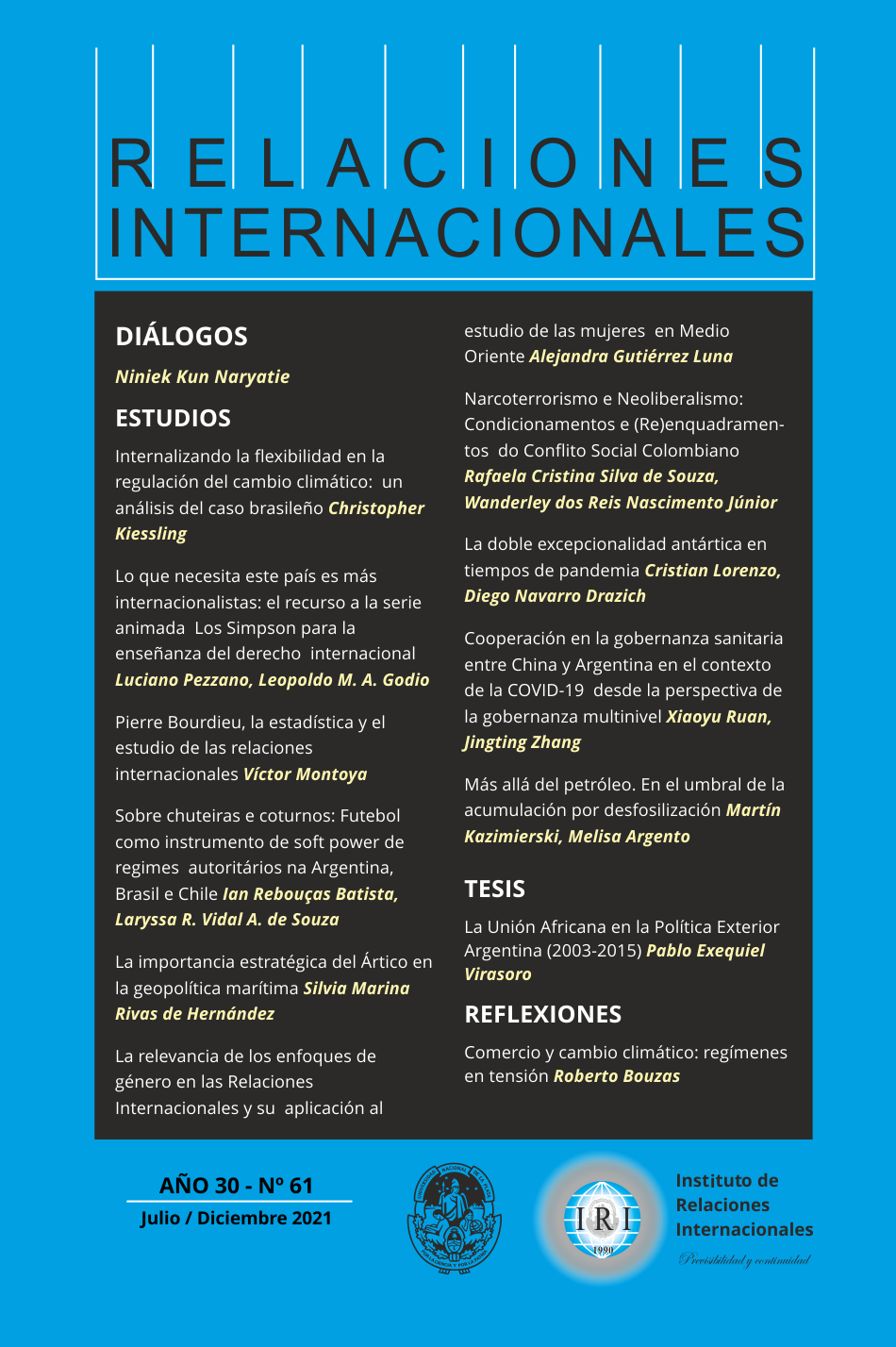This country needs more internationalists: using the animated series "The Simpsons" to teach international law
DOI:
https://doi.org/10.24215/23142766e119Keywords:
Teaching methodologies, Public International Law, popular culture, The SimpsonsAbstract
This paper aims at discussing the use of the well-known animated television series The Simpsons as a multifunctional instrument for the design of new methodological strategies to teach international law. Given that its use for pedagogical purposes in other disciplines has been well documented –and since its impact on our country's popular culture has marked several generations of students–, this proposal suggests that the richness in The Simpsons’ plot provides lots of examples that bring students closer to the most diverse issues addressed in public international law. The series also allows for the development of activities entirely focused on some of its episodes, from which a specific case is provided.
Downloads
References
ARREDONDO, R. (2016). Derecho Diplomático y Consular, Abeledo-Perrot.
BERASATEGUI, V.E. (2011). Malvinas. Diplomacia y Conflicto Armado, Proa.
BERGOGLIO, M. I. (2006). “Las facultades de derecho argentinas entre las tradiciones y los esfuerzos de cambio”, en R. Pérez Perdomo & J. Rodríguez Torres (comp.), La formación jurídica en América Latina, Universidad Externado de Colombia, pp. 101-130.
BÖHMER, M. F. (2003). “Algunas sugerencias para escapar del silencio del aula”, Academia. Revista sobre enseñanza del Derecho de Buenos Aires, año 1, n° 1, pp. 13-34.
CONSIGLI, J. A. (coord.) (2011). Piratería en el siglo XXI: nuevos escenarios para el derecho internacional, Consejo Argentino para las Relaciones Internacionales.
COZZETTI, M. (2011). “Bart, el coleccionista”, El Reverso, nº 8, pp. 4-5.
DEVINS, N. (2007). “The D'Oh! of Popular Constitutionalism”, Michigan Law Review, v. 105, n° 6, pp. 1333-1351.
EIKMEIER, G. M. (2008). “D'oh! Using ‘The Simpsons’ to Improve Student Response to Literature”, The English Journal, v. 97, n° 4, pp. 77-80.
FELMATE, D. (2013). “It’s Funny Because It’s True? The Simpsons, Satire, and the Significance of Religious Humor in Popular Culture”, Journal of the American Academy of Religion, v. 81, n° 1, pp. 222-248.
FUCITO, F. (2000), El profesor de derecho en las universidades de Buenos Aires y Nacional de La Plata. Un estudio comparativo, Editorial de la Universidad Nacional de La Plata.
GODIO, L. M. A. (2012). “El Derecho del Mar”, en R. Arredondo (dir.), Manual de Derecho Internacional Público, La Ley, pp. 523-558.
GROENING, M. (ed.) (1993). Bart Simpson's Guide to Life: A Wee Handbook for the Perplexed, HarperCollins Publisher.
GUTOFF, J. M. (2000). “The Law of Piracy in Popular Culture”, Journal of Maritime Law and Commerce, v. 31, n° 4, pp. 643-648.
HO, K. K. (2003). “The Simpsons and the Law: Revealing Truth and Justice to the Masses”, UCLA Entertainment Law Review, v. 10, n° 2, pp. 275-288.
IRWIN, W., CONARD, M. T. & SKOBLLE, A. J. (2009). Los Simpson y la Filosofía, Blackie Books.
JAMNEJAD, M. & WOOD, M. (2009). “The Principle of Non-intervention”, Leiden Journal of International Law, v. 22, pp. 345-381.
KESLOWITZ, S. (2008). “The Simpsons, 24, and the Law: How Homer Simpson and Jack Bauer Influence Congressional Lawmaking and Judicial Reasoning”, Cardozo Law Review, v. 29, pp. 2787-2822.
KOHEN, M. G. & RODRÍGUEZ, F. D. (2015). Las Malvinas entre el Derecho y la Historia, Eudeba.
LISTA, C. A. (2006), “La educación jurídica en Argentina: tendencias y perspectivas”, en R. Pérez Perdomo & J. Rodríguez Torres (comp.), La formación jurídica en América Latina, Universidad Externado de Colombia, pp. 237-273.
LUCCASEN, R. A. & THOMAS, M. K. (2010). “Simpsonomics: Teaching Economics Using Episodes of ‘The Simpsons’”, The Journal of Economic Education, v. 41, n° 2, pp. 136-149.
SÁNCHEZ, C. H. (2010), Todo lo que sé de ciencia lo aprendí mirando Los Simpson, Ed. del autor.
SCANLAN, S. J. & FEINBERG, S. L. (2000), “The Cartoon Society: Using ‘The Simpsons’ to Teach and Learn Sociology”, Teaching Sociology, v. 28, n° 2, pp. 127-139.
TERRELL, S. (2014/2015). “LOL Teacher! Using humor to enhance student learning”, Educational Horizons, v. 93, n° 2, pp. 6-7.
TURNER, C. (2004). Planet Simpson: How a Cartoon Masterpiece Documented an Era and Defined a Generation, Random House.
Downloads
Published
How to Cite
Issue
Section
License
Aquellos autores/as que tengan publicaciones con esta revista, aceptan los términos siguientes:
- Los autores/as conservarán sus derechos de autor y garantizarán a la revista el derecho de primera publicación de su obra. A partir de noviembre del 2020 los artículos se publicarán en la revista bajo una licencia Creative Commons Atribución- NoComercial-CompartirIgual 4.0 Internacional (CC BY-NC-SA 4.0). Acorde a estos términos, el material se puede compartir (copiar y redistribuir en cualquier medio o formato) y adaptar (remezclar, transformar y crear a partir del material otra obra), siempre que a) se cite la autoría y la fuente original de su publicación (revista y URL de la obra), b) no se use para fines comerciales y c) se mantengan los mismos términos de la licencia.
Previo a esta fecha los artículos se publicaron en la revista bajo una Licencia de reconocimiento de Creative Commons (BY-SA 2.5). - Los autores/as podrán adoptar otros acuerdos de licencia no exclusiva de distribución de la versión de la obra publicada (p. ej.: depositarla en un archivo telemático institucional o publicarla en un volumen monográfico) siempre que se indique la publicación inicial en esta revista.
- Se permite y recomienda a los autores/as difundir su obra a través de Internet (p. ej.: en archivos telemáticos institucionales o en su página web) antes y durante el proceso de envío, lo cual puede producir intercambios interesantes y aumentar las citas de la obra publicada. (Véase El efecto del acceso abierto).


























